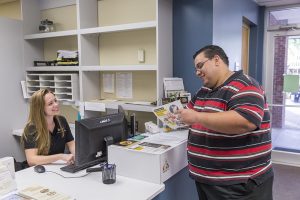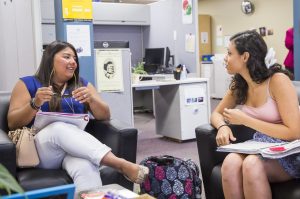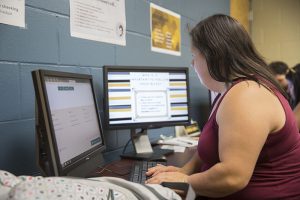Academic Accommodation Application Guide
This page will guide you step-by-step on how to apply for academic accommodations through UCF Student Accessibility Services. This includes requests for testing accommodations, notetaking technology support, communication access, and other requests for lecture, lab, and internship courses.
1. Submit the Student Application (via Knights Access)
Click the Student Application link and complete it. You will be prompted to provide your NID and NID password.
- Accelerated Consideration: Don’t want to wait for a meeting or don’t feel that it is necessary to meet with someone in SAS?
- Accelerated Consideration is an option for students who want SAS to consider specific accommodations without scheduling a meeting.
- While you may miss the opportunity to talk with an SAS consultant about the accommodation process and other resources at UCF, the Accelerated Consideration option can allow you to avoid wait times for meetings and potentially let you receive certain accommodations more quickly.
- After you submit your application to SAS, you are responsible for reading your emails and following the steps indicated whether you are or are not approved for accommodations through Accelerated Consideration.
- Within two business days, you will be notified if any accommodations are approved through Accelerated Consideration or if a Welcome Meeting needs to be scheduled.
- If approved for Accelerated Consideration accommodations, you may still choose to meet with someone later to discuss the accommodation process and other UCF resources. Students may also choose to request other accommodations after approval, which would require a meeting with an SAS consultant.
- You must submit your application AND documentation at the same time to use this option.
2. Provide Documentation (if available)
After submitting your online application, you will be invited to submit documentation via electronic upload. SAS offers an optional Academic Accommodation Provider Form that students can have their healthcare provider complete.
SAS offers the following recommendations regarding documentation:
-
- Psychoeducational evaluations are most helpful when available. IEPs, 504 Plans, and letters from doctors/providers are also beneficial for review.
- Documentation is most beneficial when it provides specific insight into how a disability impacts various academic experiences (testing, reading, etc.). When the recommendations are for support to enhance success or are considered outside the scope of what is necessary for equal access, the student will be referred to other resources and or given options that may be able to address the specific need.
- Please note that you should not delay meeting with us if you are concerned about not having the right documentation. Each consultant will discuss specific third-party documentation needs during the Welcome Meeting and steps you can take after the meeting. Our priority is meeting with you, not reviewing the documentation. Insufficient documentation will not delay the initial meeting but may delay the consideration and possible approval of certain accommodations.
- Click for more information on Reasonable Accommodation Analysis for Academic and Housing Requests.
3. Check UCF Email and Follow the Prompts
After you submit your application, you will immediately receive an automated email informing you that SAS will review your application. SAS will then contact you via UCF email within two business days regarding your next step. For students with a UCF ID and UCF email address, SAS will only send email communications via the UCF email system.
After our initial application review and unless accommodations are approved through the Accelerated Consideration option, you will receive an email with information on scheduling an initial Welcome Meeting with us. If you are prompted to schedule a Welcome Meeting, keep these tips in mind:
- It may take a minimum of three weeks to schedule a Welcome Meeting. Students new to UCF are strongly encouraged to request accommodations from SAS as early as possible prior to attending UCF.
- During the Welcome Meeting, an SAS staff member will talk with you about the academic challenges you are experiencing relative to your disability, reasonable accommodations to address the academic barriers, and potential next steps and accommodation options. Our goal is to keep the meeting relaxed and comfortable.
- Current UCF students may request accommodations at any time but are encouraged to meet with SAS as soon as they become aware of a need. We do not accommodate retroactively.
- It may take time after a Welcome Meeting to finalize and facilitate accommodations. For example, providing testing accommodations often requires a five-business day notice.
While you are waiting for your meeting, review our information on Transitioning with Accommodation from High School to UCF or Learn More about Accommodations.
4. Questions or Concerns at Any Point in the Semester
We know that questions, challenges, and concerns may arise. The SAS staff member you met with initially would be happy to answer any follow-up questions. One of the biggest mistakes students make is waiting too long to address a concern.
Email or call your initial SAS contact.
Don’t remember who you met with? You can email us at sas@ucf.edu, call 407-823-2371, or visit our office.
Taking Classes at a UCF Connect Campus?
The SAS team on the Orlando campus works closely with the UCF Connect Campuses SAS contacts. If you are taking a course at a UCF Connect Campus and want to set up a Welcome Meeting, you can contact our Orlando office to schedule. Meetings can be done either in person at the Orlando campus or online via zoom. To see our listing of Connect Campus representatives, please view the Connect Campus Contact List.
Temporary Disability and Accommodations
For students who need temporary disability accommodation considerations (such as for a dominant broken arm/wrist or for a concussion with sustained symptoms):
- SAS is available for a consultation to discuss options. To schedule a Welcome Meeting, please review the steps outlined on this page.
- Not all temporary disabilities are situations that fall within SAS’ role to address with accommodations. In some cases, students will need to explore options with professors without SAS involvement.
- Facilitation of any accommodations requires reasonable time frames to assess and coordinate. Accommodations may not be able to be facilitated immediately even when temporary situations are new with potentially immediate academic consequences.
- No Personalized Transportation Service as an Accommodation: Please note that personal transportation and travel to and around campus are the responsibility of each individual, regardless of personal situation. SAS and UCF do not have any personalized, door-to-door transportation services for students with chronic or temporary disabilities. All students need to utilize the resources available on campus, such as the UCF shuttle and strategic parking.



